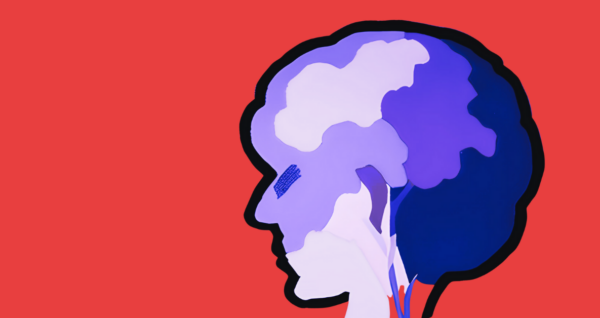TW: This article contains descriptive information about physical violence. Please engage in self-care as you read this article.
While traumatic brain injuries (TBI) among athletes, particularly football players, have garnered much attention in recent years, a critical and underdiagnosed group has mainly gone unnoticed: domestic violence survivors.
According to the CDC, TBI is a leading cause of death and disability in the United States. Yet, the prevalence of TBI among domestic violence survivors remains a largely under-addressed issue.
Traumatic Brain Injury: Causes & Symptoms
TBIs are life-altering injuries — resulting from a blow or jolt to the head or from an object penetrating the brain tissue —that can severely affect an individual’s mental and physical health.
In the context of domestic violence, TBI can occur due to physical abuse such as hitting, choking, or slamming the victim’s head against a hard surface. TBI can also result from strangulation, a common form of abuse among domestic violence survivors.
The symptoms of TBI can vary depending on the severity of the injury, but they can include headaches, dizziness, nausea, confusion, memory loss, and changes in mood or behavior. TBI can also result in long-term cognitive, emotional, and physical impairments that can devastate a person’s quality of life.
Domestic violence survivors who have experienced TBI may face additional challenges in recovering from their overall trauma. They may also require specialized medical care and rehabilitation services to address ongoing physical and cognitive impairments.
The Hidden Epidemic: TBI in Domestic Violence Victims
Survivors of domestic violence are at a high risk of sustaining a TBI, often due to repeated head injuries. Studies have reported a prevalence of intimate partner violence (IPV)-related TBIs ranging from 19% to 75%, and as high as 100% in studies that only included survivors that reported injuries to the head.
However, the rate of TBI diagnosis among this population is significantly lower than that of athletes. This disparity can be attributed to several factors, including the stigma surrounding domestic violence that discourages survivors from seeking help. But this is also the direct result of a lack of awareness about the prevalence of IPV-related TBI among healthcare providers — When seeking emergency medical care, survivors of abuse are rarely screened for head injuries and TBI symptoms.
Furthermore, because of considerable symptom overlap, IPV-related TBI is often misdiagnosed as posttraumatic stress syndrome (PTSD) or personality disorders. According to a peer-reviewed article in Trauma, Violence, & Abuse,
If traumatic brain injury is not considered a consequence of interpersonal violence, a victim’s behavior can be misunderstood by people with whom the victim interacts, including health professionals. Misdiagnosis of brain-injured behavior as a personality disorder can result in lack of assessment of a physical problem underlying the behavior. So-called difficult clients who are perceived as being noncompliant, bothersome, or extremely impatient are unlikely to be referred for advanced treatment, including neuropsychological or neurological evaluation or rehabilitation.
When TBI goes undiagnosed in domestic violence survivors, they may not receive the necessary care and support to recover. Misdiagnosis can also lead to an increased risk for further injury and worsening of existing symptoms — untreated TBI can contribute to chronic pain, mental health disorders, and an increased risk for substance abuse and suicide.
Survivors Deserve Better
The underdiagnosis of TBI among domestic violence survivors is a pressing issue that demands increased awareness and action.
Earlier this month, the New York State Department of Health and Office for the Prevention of Domestic Violence announced new efforts to raise awareness of the prevalence of traumatic brain injuries among survivors of abuse and the critical role proper screening can play in health outcomes.
Victim advocates, healthcare providers, and law enforcement officials need to be aware of the potential for TBI among domestic violence survivors. Early intervention and appropriate treatment can help minimize TBI’s long-term impact and support the survivor’s journey to healing.
If you or someone you know is experiencing domestic violence, know that there are resources available. The National Domestic Violence Hotline provides confidential support and information 24/7 at 1-800-799-SAFE (7233).
If you live in New York City, please get in touch with Sanctuary for Families to get help.
SOURCES
Banks, M. E. (2007). Overlooked But Critical: Traumatic Brain Injury as a Consequence of Interpersonal Violence. Trauma, Violence, & Abuse, 8(3), 290–298. https://doi-org.libproxy.newschool.edu/10.1177/1524838007303503
Kwako, L. E., Glass, N., Campbell, J., Melvin, K. C., Barr, T., & Gill, J. M. (2011). Traumatic brain injury in intimate partner violence: A critical review of outcomes and mechanisms. Trauma, Violence, & Abuse, 12(3), 115-126. https://doi.org/10.1177/1524838011404251
Manoranjan, B., Scott, T., Szasz, O. P., Bzovsky, S., O’Malley, L., Sprague, S., Perera, G., Bhandari, M., & Turkstra, L. S. (2022). Prevalence and Perception of Intimate Partner Violence-Related Traumatic Brain Injury. The Journal of head trauma rehabilitation, 37(1), 53–61. https://doi.org/10.1097/HTR.0000000000000749
Silver, J. M., McAllister, T. W., & Arciniegas, D. B. (2009). Depression and cognitive complaints following mild traumatic brain injury. The American journal of psychiatry, 166(6), 653–661. https://doi.org/10.1176/appi.ajp.2009.08111676
Valera, E. M., & Kucyi, A. (2017). Brain injury in women experiencing intimate partner-violence: Neural mechanistic evidence of an “invisible” trauma. Brain Imaging and Behavior, 11(6), 1664-1677. https://doi.org/10.1007/s11682-016-9643-1
